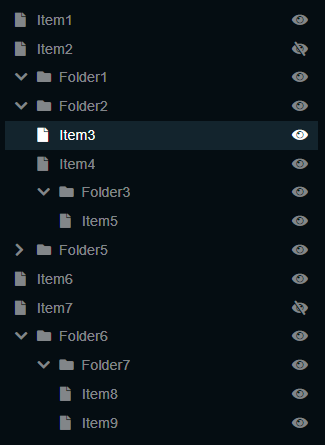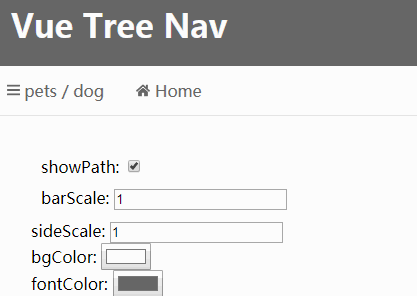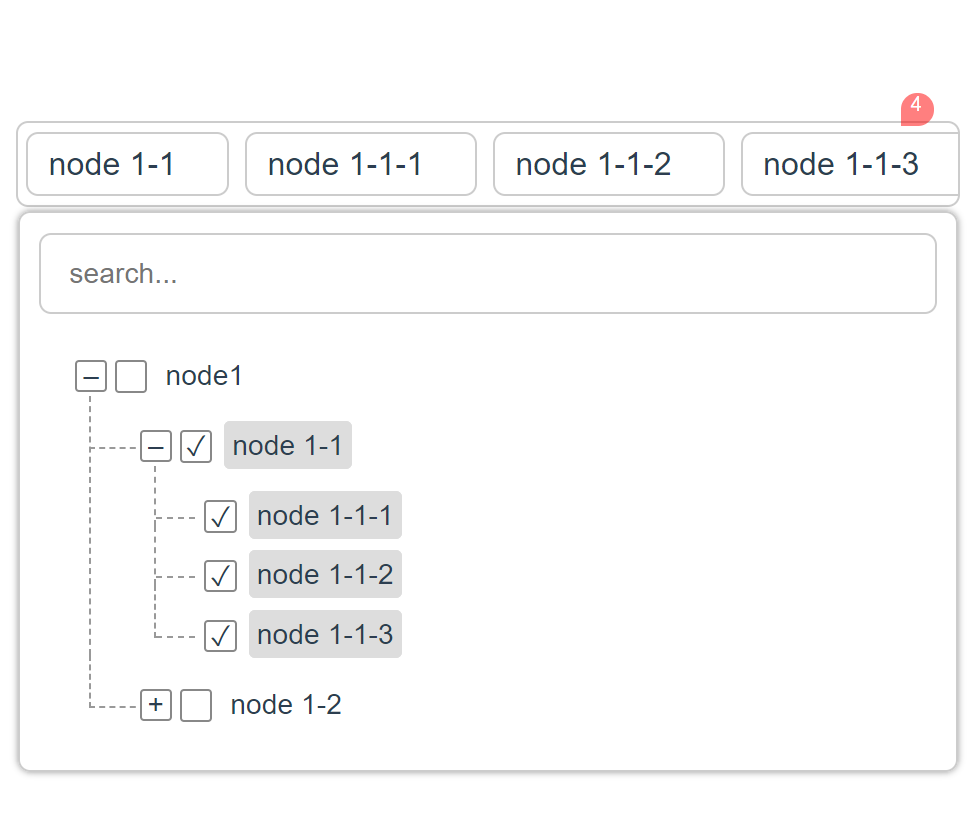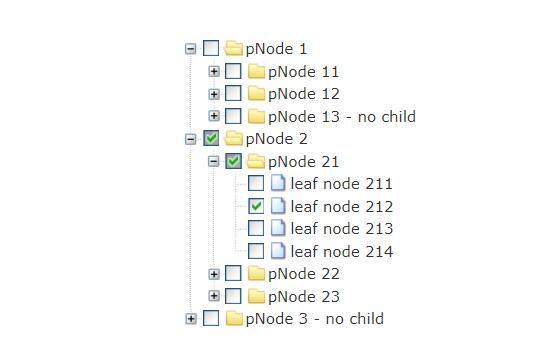sl-vue-tree
Customizable draggable tree component for Vue.js
install
npm i sl-vue-tree
Quick start
<div id="app">
<sl-vue-tree v-model="nodes"/>
</div>
<link rel="stylesheet" href="dist/sl-vue-tree-dark.css">
<script src="dist/sl-vue-tree.js"></script>
<script>
var nodes = [
{title: 'Item1', isLeaf: true},
{title: 'Item2', isLeaf: true, data: { visible: false }},
{title: 'Folder1'},
{
title: 'Folder2', isExpanded: true, children: [
{title: 'Item3', isLeaf: true},
{title: 'Item4', isLeaf: true}
]
}
];
new Vue({
el: '#app',
components: { SlVueTree },
data: function () {
return {
nodes: nodes
}
}
});
</script>
The value property is array of ISlTreeNodeModel nodes:
interface ISlTreeNodeModel<TDataType> {
title: string;
isLeaf?: boolean;
children?: ISlTreeNodeModel<TDataType>[];
isExpanded?: boolean;
isSelected?: boolean;
data?: TDataType; // any serializable user data
}
For convenience the component's events returns ISlTreeNode objects those actually are ISlTreeNodeModel
with some computed props:
interface ISlTreeNode<TDataType> extends ISlTreeNodeModel<TDataType> {
isFirstChild: boolean;
isLastChild: boolean;
isVisible: boolean; // node is visible if the all of it's parents are expanded
level: number; // nesting level
ind: number; // index in the array of siblings
path: number[]; // path to node as array of indexes, for exaple [2, 0, 1] in example above is path to `Item4`
pathStr: string; // serialized path to node
children: ISlTreeNode<TDataType>[];
}
You can get the list of ISlTreeNode from the computed slVueTree.nodes property
Props
| prop | type | default | description |
|---|---|---|---|
| value | ISlTreeNodeModel[] | [] | An array of nodes to show. Each node represented by ISlTreeNodeModel interface |
| allowMultiselect | Boolean | true | Disable or enable the multiselect feature |
| edgeSize | Number | 3 | Offset in pixels from top and bottom for folder-node element. While dragging cursor is in that offset, the dragging node will be placed before or after the folder-node instead to be placed inside the folder. |
| scrollAreaHeight | Number | 70 | Offset in pixels from top and bottom for the component element. While dragging cursor is in that area, the scrolling starts. |
| maxScrollSpeed | Number | 20 | The scroll speed is relative to the cursor position. Defines the max scroll speed. |
Computed props
| prop | type | description |
|---|---|---|
| nodes | ISlTreeNode[] | List of nodes with some computed props. See ISlTreeNode interface. |
| cursorPosition | ICursorPosition | Represents the current cursor position that describes the action that will be applied to the dragged node while mouseup event. See ICursorPosition interface |
| selectionSize | Number | The count of selected nodes |
| isDragging | Boolean | True if nodes are dragging |
interface ICursorPosition<TDataType> {
node: ISlTreeNode<TDataType>;
placement: 'before' | 'inside' | 'after';
}
Events
| event | callback arguments | description |
|---|---|---|
| input | nodes: ISlTreeNodeModel[] | triggers for any changes for value property |
| select | selectedNodes: ISlTreeNode[], event: MouseEvent | triggers when a node has been selected/deselected |
| toggle | toggledNode: ISlTreeNode, event: MouseEvent | triggers when a node has been collapsed/expanded |
| drop | draggingNodes: ISlTreeNode[], position: ICursorPosition, event: MouseEvent | triggers when dragging nodes have been dropped |
| nodeclick | node: ISlTreeNode, event: MouseEvent | handle click event on node |
| nodedblclick | node: ISlTreeNode, event: MouseEvent | handle dblclick event on node |
| nodecontextmenu | node: ISlTreeNode, event: MouseEvent | handle contextmenu event on node |
Methods
| method | description |
|---|---|
| getNode(path: number[]): ISlTreeNode | Find the node by using it's path |
| traverse(cb: (node: ISlTreeNode, nodeModel: ISlTreeNodeModel, siblings: ISlTreeNodeModel[]) => boolean) | Helpful method to traverse all nodes. The traversing will be stopped if callback returns false. |
| updateNode(path: number[], patch: Partial |
Update the node by using it's path |
| select(path: number[], addToSelection = false) | Select the node by using it's path |
| getNodeEl(): HTMLElement | Get the node HTMLElement by using it's path |
| getSelected(): ISlTreeNode[] | Get selected nodes |
| remove(paths: number[][]) | Remove nodes by paths. For example .remove([[0,1], [0,2]]) |
| getFirstNode(): ISlTreeNode | Get the first node in the tree |
| getLastNode(): ISlTreeNode | Get the last node in the tree |
| getNextNode(path: number[], filter?: (node: ISlTreeNode |
Get the next node. You can skip the next nodes by using filter |
| getPrevNode(path: number[], filter?: (node: ISlTreeNode |
Get the previous node. You can skip the previous nodes by using filter |
Slots
| slot | context | description |
|---|---|---|
| title | ISlTreeNode | Slot for item title |
| toggle | ISlTreeNode | Slot for expand/collapse button |
| sidebar | ISlTreeNode | Sidebar content |
| draginfo | SlVueTree | Slot that follows the mouse cursor while dragging. By default shows the dragging nodes count. |
Example:
handle keydow and keyup events via getNextNode and getPrevNode methods
Example:
add a folder or item icon via title slot
<sl-vue-tree v-model="nodes">
<template slot="title" slot-scope="{ node }">
<span class="item-icon">
<i class="fa fa-file" v-if="node.isLeaf"></i>
<i class="fa fa-folder" v-if="!node.isLeaf"></i>
</span>
{{ node.title }}
</template>
</sl-vue-tree>
Example:
select all nodes
slVueTree.traverse((node, nodeModel, path) => {
Vue.set(nodeModel, 'isSelected', true);
})





